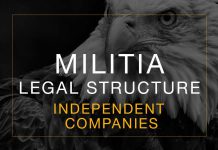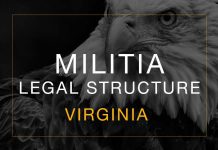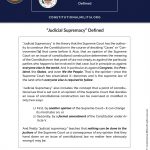Militia: A Sovereign Entity
Militia: A Sovereign Entity“THE MILITIA OF THE SEVERAL STATES” ARE INSTITUTIONS OF GOVERNMENT, THOROUGHLY CIVILIAN, WHICH ARE LARGELY OUTSIDE THE JURISDICTION OF CONGRESS THAT...
Senior Class
The Senior ClassThe separate status of the Senior Class did not entail inferior organization. To the contrary: The Senior Class was highly organized throughout...
“Watch” and the “Ward”
"Watch" and the "Ward"To this day the Militia retain the explicit constitutional authority—that no police forces share —“to execute the Laws of the Union”...
Independent Companies
Independent Militia CompaniesContrary to popular belief circulating among many patriots today, constitutional Militia are not formed by a well-intentioned group of people in possession...
Fines
Fines: A Means of Enforcement to Regulate the Militia.Pre-constitutional Militia enforced discipline by levying fines against defaulters. And that these statutes were not paper...
Exemptions
Legal definition of "exemption"
In general, “to exempt” means “o privilege; to grant immunity from”. More specifically here, “to exempt” means “o release or deliver...
Virginia “Regulating” Her Militia
Pre-constitutional Virginia Regulating Her MilitiaFrom the earliest days, Virginia recognized, as she declared in 1672 and reaffirmed in 1676, that “against all tymes of danger...
Rhode Island “Regulating” Her Militia
Pre-constitutional Rhode Island Regulating Her MilitiaAs was the case in Virginia and throughout the other Colonies and then independent States, in their titles, their bodies,...
“Settle” the Militia
"Settle" the MilitiaThe United States Constitution followed the long established legal pattern (see for example, Virginia and Rhode Island) of "settling" the Militia in...
Governor
Governor: No Arbitrary Powers Over the MilitiaBecause of the apparently broad powers that Governors in Virginia as well as other Colonies and then independent...











































